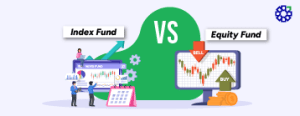Types of Index Funds
- 10th September 2025
- 10:00 AM
- 7 min read
Do you know that as of June 2025, the Nifty 50 index has delivered an average compound annual growth rate (CAGR) of 13.5% in the last 10 years? This shows how index funds can be a good choice for investors in the long run.
However, index mutual funds are of different categories, and investors often get confused about which one is beneficial for them. Let us explore the different types of index funds in which you can invest your money as per your preferences and investment goals.
What Does an Index Fund Mean?
Index funds are a specific category of mutual funds that reflect the performance of underlying stock market indices like the Nifty 50 and the Sensex. These funds pool money from investors and invest in the same proportion as the index they track.
Investors seeking a low-cost and low-risk investment option can invest in index funds. These funds are specifically for investors looking to earn profit from the broader stock market rather than focusing on individual stocks.
Types of Index Funds to Invest In
There are different types of index mutual funds available in the Indian securities market, and each of them offers distinct features for investors. This confuses investors as to which one to choose. Here are the top 9 types of index funds for you:
-
Market Capitalisation Index Funds
Market capitalisation index funds focus on indices based on the market capitalisation of companies. You can invest in large-, mid-, and small-cap mutual funds in this category of mutual funds.
Companies with larger market capitalisation are given higher weightage in this category of mutual fund. On the other hand, companies with low market capitalisation have a lower weightage. You can diversify your portfolio by investing in funds that target both small-, mid-, and large-cap companies.
-
Broad Market Index Funds
The broad market index funds reflect the performance of a broad stock market index like the Nifty 500 in India. This category of index funds focuses on companies from diverse sectors, allowing investors to invest in the broader market and diversify their portfolio. This is why long-term investors can benefit the most from these funds.
-
Equal Weight Index Funds
An equal-weight index fund is a type of index fund where every stock in the index has equal weightage. All the companies are conceptually weighted at an equal percentage, whether it is 2% or 4%.
By allocating equal weightage to each stock, equal-weight index funds address the risk of over-concentration in some large-cap stocks. This ensures no single stock dominates the portfolio. As a result, there will be more balance in the risk exposure of a portfolio.
-
Sector-Based Index Funds
This category of index funds provides exposure to particular sectors like banking, healthcare, and information technology (IT). You can capitalise on the growth of each sector and gain targeted exposure. However, there can be a higher risk due to concentrated investments.
-
Strategy Index Fund
Strategy index funds are particular categories of mutual funds that reflect a strategy index’s performance. You may invest in a strategy index fund, which aims to replicate an index’s performance by tracking high dividend yield or less volatile stocks. These indices also include numerous types of asset classes, including equity and debt.
These funds help you generate wealth by providing a systematic approach to investing, aligning with particular strategies.
-
Factor-Based or Smart Beta Index Funds
This category of index funds invests in stocks of an index based on specific criteria, factors, or investment strategies. These funds focus on factors like momentum, quality, and growth. Based on a particular factor, these funds allocate weightage to the stock. For instance, a company with a higher return on equity (ROE) may get a higher weightage in a factor-based index fund.
-
Debt Index Funds
Debt index funds focus on fixed-income indices, which offer exposure to debt securities like bonds. However, these funds are also less popular in India due to their higher associated risks. These funds are preferred by investors seeking stable income and low-risk options in their investment portfolios.
Some of the major risks of debt index funds are changes in interest rates that impact bond prices and the risk of default when a debt instrument issuer fails to pay.
-
International Index Funds
If you want international exposure by diversifying your investments throughout the world, international index funds can be beneficial for you. With these funds, you can capitalise on opportunities in the international markets. International index funds track indices that include bonds, stocks, and other securities issued by companies and governments throughout the world.
-
Custom Index Funds
Custom index funds allow advisory firms and institutions to create their own investing strategies in a passive framework. This category of index funds reflects the performance of indices that are customisable to meet the needs of institutional investors or major clients.
If you are looking for index funds, you can download the PL Capital Group – Prabhudas Lilladher application and open a Demat account for free. With PL, you can build your wealth through both systematic investment plans (SIP) and lump sums.
Benefits of Investing in Index Funds
Since you know different types of index funds, let us explore the benefits of investing in index funds:
-
Broader Market Exposure
Index funds provide you with broader market exposure to numerous stocks by replicating the market indices. It also reduces unsystematic risks and helps investors to benefit from the market trends instead of focusing on individual stock performance.
-
Lower Management Costs
Index funds have lower expense ratios, which can be beneficial for investors aiming for higher returns.
-
Low Risks
Since index funds diversify investments in different sectors and multiple stocks, they can reduce your risks and offer higher stability.
-
Long-term Investment Benefits
Index funds suit the investors who seek long-term growth. These funds reflect the market performance without any active management or daily adjustments.
Risks of Investing in Index Funds
Before investing in this investment vehicle, you must also consider the associated risks. Here are the associated risks of investing in index funds:
- Irrespective of market conditions, the flexibility in index funds is less since they track an index.
- This type of mutual fund includes passive management of funds. This can result in a lack of risk mitigation strategies. Investors need to be aware of adverse market conditions.
- Index funds may not reflect an index’s returns because of tracking errors.
- Some index funds can have a high exposure to specific industries. This makes them vulnerable to industry-specific risks.
Final Thought
Having a look at these 9 different types of index funds helps you to understand the unique features of each fund type. They offer benefits like access to broader market exposure, long-term investment benefits, and lower management costs. Conversely, they also involve risks due to less flexibility, tracking errors, and industry trends.
Download the PL Capital application and choose the best index fund based on your risk tolerance and investment goals.
Frequently Asked Questions
1. How many types of index funds are available in India?
There are different types of index funds available in India. However, some of the popular funds are sectoral funds, market capitalisation index funds, and international funds.
2. Which index fund provides the highest return?
There is no specific category of index fund that provides the highest returns. Investors have to conduct research on different types of index funds before investing.
3. Which Nifty index fund is considered the best?
There is no nifty index fund, which is considered the best, because the performance of each fund can be impacted by short-term market movements.





